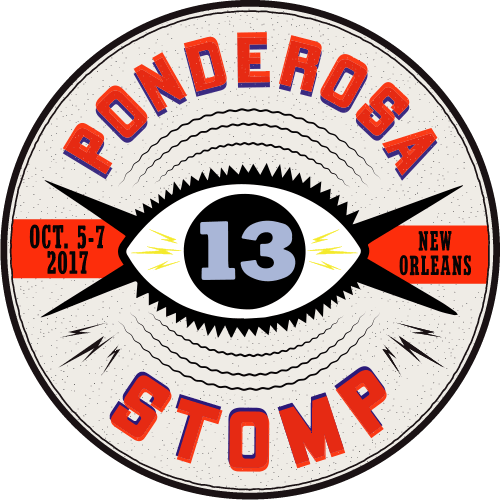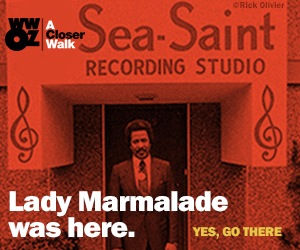 Metairie is a place often disparaged by those “not from here.” It is especially disparaged by those not from here who seek to cloak themselves and where they came from in all things New Orleans. By disparaging our hinterlands, they strive to make themselves all the more genuinely New Orleans. Ironically, these self-appointed New Orleans experts miss the “tout ensemble” for the trees (or maybe the lack thereof). They fail to discern that there is often more New Orleans buried amid the neon-and-concrete trappings of seemingly bland suburbia than in the city itself these days. Especially musically.
Metairie is a place often disparaged by those “not from here.” It is especially disparaged by those not from here who seek to cloak themselves and where they came from in all things New Orleans. By disparaging our hinterlands, they strive to make themselves all the more genuinely New Orleans. Ironically, these self-appointed New Orleans experts miss the “tout ensemble” for the trees (or maybe the lack thereof). They fail to discern that there is often more New Orleans buried amid the neon-and-concrete trappings of seemingly bland suburbia than in the city itself these days. Especially musically.
 Mo’s Chalet is just such an under-the-radar den of down-home blues. Impresario Morell “Mo” Crane is an important patron of local music, particularly the classic styles such as jazz, rhythm and blues, and swamp pop. Mo brought in his old friend, sax titan Sam Butera, years before the New Orleans JazzFest ever sat up and took notice that the supercharged turbine behind Louie Prima was still jumping, jiving, and wailing like never before, well into his 70s.
Mo’s Chalet is just such an under-the-radar den of down-home blues. Impresario Morell “Mo” Crane is an important patron of local music, particularly the classic styles such as jazz, rhythm and blues, and swamp pop. Mo brought in his old friend, sax titan Sam Butera, years before the New Orleans JazzFest ever sat up and took notice that the supercharged turbine behind Louie Prima was still jumping, jiving, and wailing like never before, well into his 70s.
But Mo doesn’t just hire the well-known entertainers. Super-talented rank-and-file artists who somehow got lost in the shuffle but are still cranking it out in the musical trenches can find a welcome stage at Mo’s Chalet. Names such as Bobby Lonero, Earl Stanley, Skip Easterling, Eddie Powers, Art SirVan, Allen Collay, Al McCrossen, and Billy Bell. These are just the sort of hidden gems that the Ponderosa Stomp strives to spotlight. And such a roster fits in with Mo’s motto: “GIVE THE PEOPLE WHAT THEY WANT.”
And “the people,” in Mo’s case, fit a certain demographic. They are either members of “the Greatest Generation” or hail from the immediately younger age groups. These are the people who grew up in a still-vibrant New Orleans, attended its grammar and high schools, and bore witness to not only the jazz revival of the late 1940s and early ’50s, but also the birth of rock ‘n’ roll. These are the people who remember Butera and Prima blazing away on Bourbon Street and at the Beverly Club. These are the people who saw Pete Fountain and Al “Jumbo” Hirt trading lightning-bolt licks at Lenfant’s on the lakefront. These are the people who when they hear the name “Dukes of Dixieland” immediately think “Assunto brothers”—you know, those nice neighborhood Italian boys from around the French Market who just happen to have a red-hot family band. These are the people who grew up buying Fats Domino 45s and swaying to Jerry Raines’ “Our Teenage Love” at the CYO dances. They remember serving detention-hall stints with Roland “Stone” LeBlanc at Warren Easton High, or eating cheeseburgers next to a teenage Frankie Ford at Da Wabbit in Gretna after a sock hop at the McDonoghville VFW. These are New Orleans’ salt of the earth, and those who still make it out to Mo’s Chalet are the silver-fox survivors. They’re still boogieing down and drinking up well into their 60s, 70s, and 80s.
One recent Sunday I stopped in to hear vocalist Duke Duplantis front his RBT combo. What a gentleman Duke is—a total man’s man, whose specialty is singing Sinatra and other Rat Pack standards with the perfect measure of gravitas and testosterone. I don’t know who I’d be more afraid to piss off backstage in Vegas in a fight over some mob bimbo: Duke himself, or Ole Blue Eyes backed up by a gang of sycophantic “associates.” Of course, Duke—after setting you straight—would probably suggest a round of 18 holes at the local golf course and even pick up the greens fees just to show you what a stand-up guy he is.
And serving as the smiling bandleader with just a hint of an Elvis sneer to his lip, Richie Ladner brings decades of professional experience to the table, having been a latter-day member of New Orleans’ legendary Jokers. Playing with an almost pornographic joy, he is both a stellar pianist and vocalist, and his baritony rendition of “Take Me Home, Country Roads” melded into a gospel medley still sends chills down my spine. When not amazing you with his melodiousness, Ladner will slay you with his hysterically ribald humor and impeccable comic timing.
 A book could be written about saxophonist Johnny Pennino (http://www.johnnypennino.com), but luckily for the local music scene, his story is not yet over. Music aficionadoes have heard of the legendary Papa Joe’s nightclub on Bourbon Street, whose 1960s-era band featured luminaries such as Freddy Fender, Joe Barry, and Skip Easterling. Though not as well-known, Pennino made his musical bones at Papa Joe’s and was in fact that band’s longest-serving member. Fender once said of Pennino: “He blows a tenor sax in such a sweet, pleasant and unforgettable way. Nobody else can come up with anything so unique. Johnny’s sound is romantic. It is magical.” So magical that when Duke Ellington was brought to hear the young Italian stallion play on Bourbon Street in the 1960s, the Duke offered Pennino a job, asking: “Do you read music, son?”
A book could be written about saxophonist Johnny Pennino (http://www.johnnypennino.com), but luckily for the local music scene, his story is not yet over. Music aficionadoes have heard of the legendary Papa Joe’s nightclub on Bourbon Street, whose 1960s-era band featured luminaries such as Freddy Fender, Joe Barry, and Skip Easterling. Though not as well-known, Pennino made his musical bones at Papa Joe’s and was in fact that band’s longest-serving member. Fender once said of Pennino: “He blows a tenor sax in such a sweet, pleasant and unforgettable way. Nobody else can come up with anything so unique. Johnny’s sound is romantic. It is magical.” So magical that when Duke Ellington was brought to hear the young Italian stallion play on Bourbon Street in the 1960s, the Duke offered Pennino a job, asking: “Do you read music, son?”
But New Orleans’ pull was too strong on Pennino, and he stayed put, carrying the torches of Jumbo and Butera and continuing to play with an otherworldly fire-and-brimstone ferocity, yet with utter lyricism and beauty on tour-de-force power ballads such as “Europa.” Pennino’s voice on saxophone is completely unique, but then so is his shamefully undershowcased singing. His vocal rendition of Dean Martin’s “Return to Me” is incredibly sensuous, and his Elvis interpretations must have the King himself sitting up in his crypt and taking notice. But Pennino ultimately is a horn player who makes anyone’s band sound better, as evidenced by swamp-pop legend Johnnie Allan turning to me one night at a West Bank hideaway and asking in bewilderment: “WHO IS THAT GUY?” The Cajun icon was simply blown away by Pennino, who had just accompanied Allan on his own set—walking on totally unrehearsed and never having before met.
Injecting some intangible Mo-jo to the mix was John Dauenhauer on baritone sax, who is always a welcome sight wielding that bazooka-like piece of brass, which was key to the classic 1950s riffing ensemble horn sound, but which is rarely employed today—and sadly so. The titanic instrument’s notes are almost imperceptibly heard at first—hitting your gut and injecting a fat-bottomed groove to the wailing sound of the tenor above it. Thanks to Our Lady of Prompt Succor for the presence of John Dauenhauer on bari sax. He’s like a flambeaux carrier in a Mardi Gras parade: Just when you thought the tradition had died out, there he is with his big flame-throwing rig, bringing it all back home again.
Drummer Wally Rabalais is another unsung local veteran, having set a splendidly percussive tone with countless bands and frontmen like Bobby Lonero; Al Dressel and the Fugowees; and Midnight Streetcar. Rabalais is a rock-solid timekeeper but also surprises audiences with his own singing voice. For one second at Mo’s I thought Clarence “Frogman” Henry was in the house, exclaiming out of nowhere that he sang like a frog and had no home. Turns out it was Rabalais doing his dead-on Frogman impression from behind the drum kit. The legendary Frogman was hopefully enjoying some well-deserved relaxation on his front porch in Algiers, content to let his disciples do the singing.
The band entertained that Sunday with every genre of music, from cocktail-lounge warhorses to country two-steps, from Smiley Lewis’ “Someday” to Lloyd Price’s “Stagger Lee,” from Roland Stone’s “Just a Moment” to the classic 1950s doo-wop “We Belong Together.” And in true New Orleans fashion, a second-line erupted. Not a stomping parade of gator-popping buck-jumpers, but a procession of guest singers who stepped up to add their own unique spices to the mix. Owner Mo Crane’s brother Rene—a kindly venerable figure with billowy snow-white hair and a blood-red guayabera shirt—took a turn at a couple of chestnuts, and then Mo himself—a man whose infectious lust for life is positively Viagra-like—stepped up to the microphone, shucking and jiving to Al Jolson and a totally romping version of “Gentle On My Mind.”
Mo’s Chalet: A musical oasis in Metairie that really delivers on its promise to “give the people what they want.”





We’re from out of town, but with LA roots and love come there. Have looked for a place like Mo’s and really want to know more about it…spec. “what nights there’s a good band to dance to”! We’re seniors, prefer to stay in Metairie, but looking for live music. Would appreciate some info. to plan a trip soon. Thanks!
Dear Ann,
At Mo’s on Wednesday nights, New Orleans legends Earl Stanley and Eddie Powers play. On Fridays and Saturdays, Mo’s has a different rotation of bands, with Jake and the Nifty 50s bringing in a strong dancing crowd. Visit Mo’s Web site for their calendar. Also visit The Max bar (https://www.facebook.com/pages/THE-MAX-LOUNGE/115789785103786), which has local acts like the Yat Pack, Bobby Cure, and Chuck Cavet/Como. Also check out the Jefferson Orleans (https://www.facebook.com/groups/195670784381/) for big band/swing dancing.
Also, the local casinos (Boomtown, Treasure Chest, and Harrah’s, as well as those on the Mississippi Gulf coast, book local and regional bands. Also try the Boutte Bingo Hall in Boutte (https://www.facebook.com/pages/St-Charles-room-Bingo-Hall/110577415675177?rf=432581746786830) on Sunday afternoons for swamp-pop and 50s oldies bands. Also try some of the French Quarter hotels for local jazz (the Bombay Club at the Prince Conti, the Monteleone, the Ritz Carlton, and the Rossevelt).